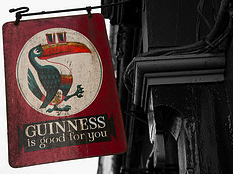Do You Mind If There’s A Little Bit Of Fish Bladder In Your Guinness?
Before you pick up that pint of Guinness (and don’t even think about dropping shots into it) this weekend for St. Patrick’s Day, vegetarians might want to heed what we’re about to say: Chances are there could be traces of fish bladder in your beer. My goodness, my Guinness, indeed.
It’s not like there are pieces of the stuff swimming around in the 100 million pints of Guinness sold worldwide every day, reports the Smithsonian Magazine’s Food & Think blog. Rather, the fish bladder is a gelatinous substance called “isinglass” (totally made in Isengard?!?!?) and is added to cask beers to assist leftover yeast and solid particles in settling out of the liquid before you drink it.
Using air-bladders from fish like the sturgeon is a process that goes back to at least 1797 in Scotland, and was a secret the Russians used to clarify glue as well. Versatile stuff, those fish bladders.
Guinness began using isinglass in its Dublin brewery in the mid-1800s, but nowadays many brewers use modern gelatin instead of isinglass, unless they’re what’s known as British “real ale” cask beers.
Strict vegetarians or vegans might want to skip Guinness if the idea of isinglass is unacceptable. According to Guinness:
“All Guinness brands are free from animal matter and from contact with animal matter. However, isinglass, which is a by-product of the fishing industry, is used as a fining agent for settling out suspended matter in the vat. The isinglass is retained in the floor of the vat but it is possible that minute quantities might be carried over into the beer.”
Vegetarians averse to animal matter in their brews might find safe drink harbor in German or Belgian beers, as those brewers stick to “purity laws” that require only the use of water, grain, hops and yeast in beer.
How about you?
Hey Vegans! There May Be Fish Bladder in Your Guinness [Smithsonian.com]
Want more consumer news? Visit our parent organization, Consumer Reports, for the latest on scams, recalls, and other consumer issues.


